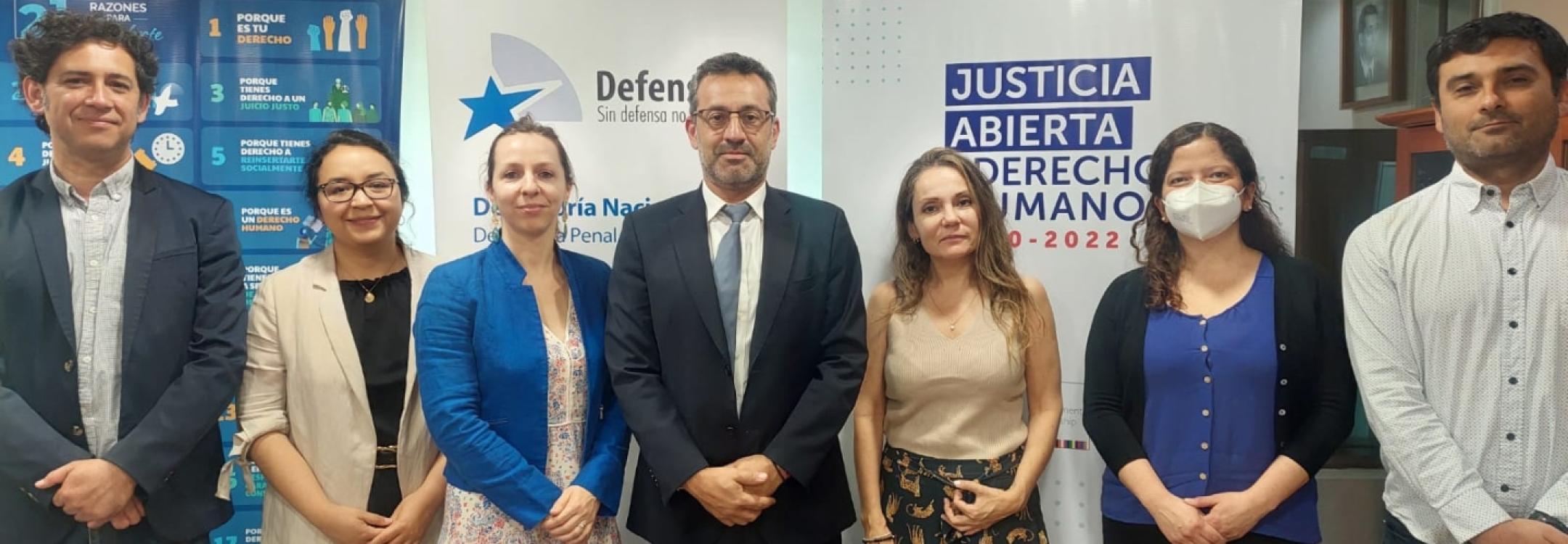
The APT has welcomed a pilot project by the Public Criminal Defender’s Office (Defensoría Penal Pública (DPP) of Chile that has established daily visits to police units by specialised public defenders who assist detainees in the critical moments following arrest.
Developed through the Defensoría Regional del Maule, the police unit defence project (information in Spanish) seeks to embeds a key safeguard set out in the Méndez Principles on Effective Interviewing: the importance of ensuring that all persons being interviewed have access to a lawyer.
As part of our visit to Chile in December 2022, the APT, together with the National Preventive Mechanism and the Chilean Ministry of Foreign Affairs, also organised a discussion on the Méndez Principles for national stakeholders.
The visit to Chile was an opportunity to discuss and reflect on the importance of the following safeguards.
Access to a lawyer and/or legal specialist has a preventive effect
The risk of torture and ill-treatment is highest during the first moments of detention. To prevent it from occurring, it is vital that procedural safeguards are implemented and respected in practice by the police.
The presence of a lawyer is important because:
- It has a deterrent effect on law enforcement officials
- It can protect law enforcement officials if they face unfounded allegations of ill-treatment
- It is closely linked to the right to defence, and to the human right of due process, because, if a detainee is left without the assistance of a lawyer he or she may be brought to trial without a proper charge and convicted on incomplete evidence, or evidence irrelevant to the case or otherwise inadmissible evidence, including evidence obtained by torture.
Detainees often lack both the skills and knowledge to exercise their rights. Therefore, the assistance of a lawyer is essential to explain their rights, how to exercise them and to guide them through each step of the process. A lawyer can also help detainees to access complaints mechanisms when abuses have already occurred.
The presence of a lawyer and/or legal specialist should be as immediate as possible at the time of detention
There can be confusion - and a legal gap - in identifying the specific moment when a lawyer should be present with the detainee. Our visit to Chile confirmed for us what several human rights bodies have pointed out: "the presence of the lawyer must be immediate, at the beginning of the deprivation of liberty".
The Méndez Principles reiterate the importance of ensuring this safeguard is applied at the first moment a person is deprived of liberty. Furthermore, our research in Does Torture Prevention Work? found that in those countries where lawyers were physically present in police stations, free of charge and on a permanent basis (United Kingdom), the treatment of detainees improved.
A lawyer or a person with knowledge of criminal law and specialist in the early stages of detention is essential to prevent torture
Lawyers should have specific knowledge and expertise about the early stages of detention. Ideally, the lawyer must meet a minimum standard of professionalism in the performance of their duties. These duties consist of protecting and promoting the rights of detainees to the best of their abilities.
Training is necessary to ensure that lawyers are able to promote implementation of fundamental procedural guarantees, such as a detainee’s access to and understanding of information about their rights, notifying third parties of the detention, and prompt presentation before a judge.
The APT’s visit to Chile highlighted that, through initiatives such as the police unit defence project, change is possible but it requires inter-institutional coordination, resources, planning and a commitment to torture prevention, including recognition of the key role of lawyers and those who provide legal guidance.
Of course, financial and human resources are needed for this project to have a national impact. In addition, dedicated spaces are also necessary to ensure that interviews between detainees and their lawyers are confidential, for which the Méndez Principles provide relevant guidelines.
